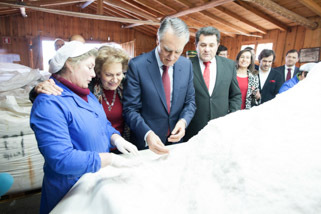
Honourable Speaker of the National Parliament
Honourable Prime Minister
Honourable President of the Supreme Court of Justice
Honourable Professor António Hespanha
Honourable Councillors
Ladies and Gentlemen
When an institution commemorates one hundred and seventy five years of existence, it is usual to salute its history, its venerable past, and its parchments of antiquity. And, in fact, the Supreme Court of Justice has treaded a long course. And treaded it with the dignity that allows us, in this beautiful Noble Hall, to salute all those that served it.
But, apart from evoking the singular memory of the Supreme Court of Justice, I want to avail myself of this solemn occasion to, very markedly, show my respect and my appreciation for Portuguese magistrature.
The Supreme Court of Justice brings together the best of that magistrature, such as is shown by the quality of its jurisprudence. But more than that: its Judge Councillors have differing views of the world, differing concepts of life and of society, greatly enriching of the work produced here which, not by chance, is closely watched by the whole of the juridical community, starting with the other courts of justice.
As I stated in this same hall, in the opening ceremony of the judicial year, we must recognize that the courts are an essential pillar of the democratic Rule of Law, and that any offence to the dignity and prestige of the judicial power is a serious threat to the democracy which we hope for. There, as well, are the needs to give careful attention to the feelings of those that live the difficult reality of seeking justice on a daily basis.
Experience and maturity are, naturally, two major qualities of the magistrates of the Supreme Court of Justice. To reach the position of a Councillor of the Supreme Court of Justice is a token of exceptional merit or of a long career of relevant services rendered in the exercise of jurisdictional functions.
Since the Supreme Court of Justice is, in the terms of the Constitution, the summit of the judiciary system, I allow myself, Venerable Councillor Noronha do Nascimento, to salute in your name all the Country’s magistrates. I am certain that this is a day of joy not only for the Supreme Court of Justice but for all the courts and for all the magistrates.
Veritably, an institution which commemorates 175 years of existence sends an important signal to Portuguese society, a signal that guarantees stability. Laws and codes are constantly changing but, for that exact reason, institutions which remain are necessary. In the Supreme Court of Justice, memory is not an adornment of the past, but a factor of security – of the judicial security which is essential for the predictability of the performance of the judicial operators and for a healthy relationship between justice and the people.
Ladies and Gentlemen,
We live in a republican regime in which, due to the terms of the Constitution, the holders of sovereign offices are temporary. We also live in a society in constant change, which suffers deep changes at a very intense rhythm, even due to circumstances which we cannot overcome, such as globalization or European integration.
We are thus in need, in our times, of references, of institutions which are rooted and socially recognized as models. Let us have no illusions: we will never be able to go forward with the changes we consider as necessary if we dispense with the knowledge learnt from experience and with the roots of life’s reality. All the reforms we implement must be understood by the people. It is very often the duty of the judicial power to mediate between such reforms and the people. Judges apply to material cases, to the real life situations, what was conceived elsewhere.
For this reason a high sense of responsibility is demanded from judges. Magistrates have an immense power over the lives of the people and, in addition, enjoy a social prestige that makes them models of behaviour for all of us. I thus entreat judges to continue being worthy of their charter, as I entreat everyone, starting with politicians, to do all in their power to guarantee the dignity of the exercise of the judicial function.
Throughout 175 years, the councillors of the Supreme Court of Justice were and are exemplary magistrates, who ally their deep knowledge of law to the sense of independence and to the discretion and reserve which are required from those who administer justice in the name of the people.
I thus salute the Supreme Court of Justice, with the regard and the veneration demanded by their 175 years of age.
© 2006-2016 Presidency of the Portuguese Republic
You have gained access to the records of the Official Site of the Presidency of the Republic from 9 March 2006 to 9 March 2016.
The contents available here were entered in the site during the 10 year period covering the two mandates of President of the Republic Aníbal Cavaco Silva.